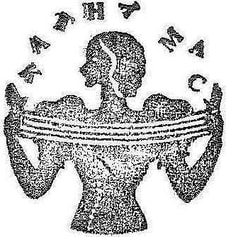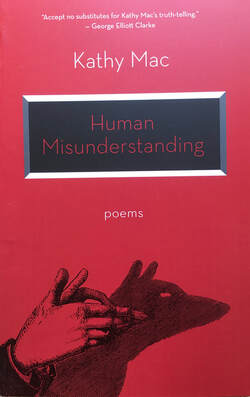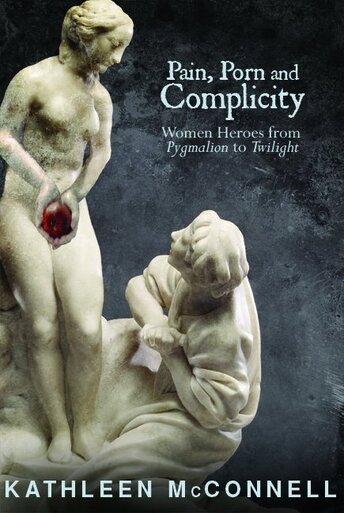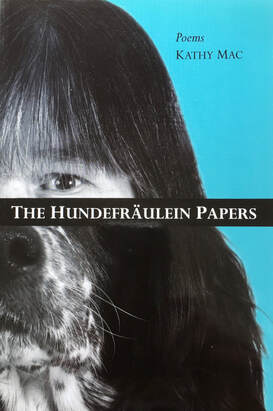Header Photo: Roland Daigle
On This Page
Human Misunderstanding, 2017
Pain Porn and Complicity: Women Heroes from Pygmalion to Twilight, 2012
The Hundefraulein Papers, 2009
Nail Builders Plan for Strength and Growth, 2001
Selections of the Other Stuff that Writers Do
(There's a link in each book's section to take you to the publisher's site, if you're interested in purchasing one.)
Human Misunderstanding, 2017
Pain Porn and Complicity: Women Heroes from Pygmalion to Twilight, 2012
The Hundefraulein Papers, 2009
Nail Builders Plan for Strength and Growth, 2001
Selections of the Other Stuff that Writers Do
(There's a link in each book's section to take you to the publisher's site, if you're interested in purchasing one.)
Human MisunderstandingRoseway Publishing, 2017
Nominated for the 2018 Fiddlehead Book Prize, New Brunswick Canada “Kathy Mac sees inside language-as-propaganda, identifying all the twists and turns that facts suffer as they become half-truths or false justifications for evils, She knows and shows that the rhetoric of the War on Terror enacts a War on Truth. Accept no substitutes for her truth-telling, which is liberating.” — George Elliott Clarke Human Misunderstanding contains three long poems. “Omar Khadr Is Not Harry Potter,” compares a fictional child soldier (hero) with a real child soldier (victim). “Human Misunderstanding: Theory, Speculation, Practice,” places eighteenth century philosophy beside one person’s late-night search for another in downtown Halifax, Canada. “A Case, E Case,” interleaves translated verses of Marie de France’s Middle English werewolf lai “Bisclavret” between verses about two sexual assault cases involving marginalized people as both defendants and prosecution. It ain’t for the faint of heart. “It is an unusual pleasure to encounter writing which recognizes, as does Kathy Mac’s wonderful new book Human Misunderstanding, that poetic form must be meaningfully related to content and can affect content.” — M Travis Lane, Fiddlehead #275 ReAD A REVIEW OF hUMAN mISUNDERSTANDING iN cv2.
rEAD A rEVIEW OF hUMAN mISUNDERSTANDING IN aTLANTIC bOOKS tODAY
|
PAin, Porn and Complicity: Women Heroes from Pygmalion to TwilightFive essays, published under Mac’s academic name, Kathleen McConnell, by Wolsak & Wynn, 2012
“Using sharp wit and brilliant analysis, McConnell presents an examination of popular texts and shows us how - like the unnamed statue in Ovid's poem - the female characters were sculpted by their creators, and their audiences.” - Nikki Stafford Drawing on a large body of research -- from chaos theory to Freud -- poet and scholar Kathleen McConnell McConnell unravels some cultural threads that bind the way women protagonists are characterized in popular culture. This careful, and at times wry, examination doesn’t just consider why authors and audiences prefer female statues; it also discusses the effect of those characterizations on the culture that consumes them. “What if Alexander Pope’s Rape of the Lock had been filmed by Steven Spielberg? What if Buffy the Vampire Slayer had gone to Columbine High? What if Leopold von Sacher-Masoch had been the dramaturge for Catwoman? Kathleen McConnell’s provocative thesis is that each of these scenarios has indeed come to pass, and what they have produced is a resilient and telling popular archive of the Pygmalion story. In this audacious and (sometimes literally) poetic collection of essays, McConnell shows us how the Pygmalion and Galatea story continually comes back to life from its stony sediments and animates the most popular of our guilty pleasures. This is a book sure to transform us.” -- Steven Bruhm, Gothic Bodies: The Politics of Pain in Romantic Fiction and Reflecting Narcissus: A Queer Aesthetic |
|
The HundeFraulein Papers
Roseway Publishing, 2009
“Like all good elegies the reader is left touched and unsettled. The Hundefräulein Papers is not a trip down memory lane, hagiography, celebrity portrait or self-justifying rumination. It is, rather, an exquisite evocation of a time and a relationship whose mystery is being reverently and rigorously pursued.” – Michael Higgins, New Brunswick Telegraph Journal, Jan 30 2010 Hunde/fräulein: Dog/nanny. For five and a half years (1995-2001) Kathy Mac lived in Sambro Head, NS, looking after anywhere from four to twelve English Setters. The post entailed maintaining the ocean-side doghouse and looking after the many, varied houseguests of the hundemutter – ocean activist Elisabeth Mann Borgese, youngest daughter of Thomas Mann. These poems take their tone from the days and dogs that inspired them – by turns extravagant, intense, celebratory, wistful. “This elegy is generically and tonally diverse, which makes for engaging reading, and is truer to life than an entirely lofty and lugubrious dirge would be.” – Jesse Patrick Ferguson, ARC Magazine |
Nail Builders Plan for
Strength and Growth

Roseway Publishing, 2002
Winner, 2002 Lampert Award for Best First Book of Poems published in Canada
Finalist, 2002 Governor General's Award For Poetry
“These are poems to really bite into and ruminate over space and time.” – Lampert Judges’ Commentary
“Poets with Kathy Mac’s impeccable technical skill are not too hard to find, but very few can touch her for emotional power, thematic range, gentle humour or quiet courage. As Robert Heinlein said of another writer, these poems should be served with a whisk broom, so that the customer may brush the sawdust off himself when he gets back up.” –Spider Robinson
“This book of poetry moves suavely and boldly between the poles of lyric voice and experimental format. Both exquisite in effect and adventurous in style, this work refashions traditional structures of poetry by charging them with a probing, questioning, restless energy.” – Governor General’s Adjudicators’ Remarks
Winner, 2002 Lampert Award for Best First Book of Poems published in Canada
Finalist, 2002 Governor General's Award For Poetry
“These are poems to really bite into and ruminate over space and time.” – Lampert Judges’ Commentary
“Poets with Kathy Mac’s impeccable technical skill are not too hard to find, but very few can touch her for emotional power, thematic range, gentle humour or quiet courage. As Robert Heinlein said of another writer, these poems should be served with a whisk broom, so that the customer may brush the sawdust off himself when he gets back up.” –Spider Robinson
“This book of poetry moves suavely and boldly between the poles of lyric voice and experimental format. Both exquisite in effect and adventurous in style, this work refashions traditional structures of poetry by charging them with a probing, questioning, restless energy.” – Governor General’s Adjudicators’ Remarks
Selections of
The other Stuff
that Writers do
Ongoing
Organizer (with Sherry Coffey and David Watts) One of the triumvirate of organizers of the Odd Sundays Reading Series, “Fredericton’s longest-running, multiply-hyphenated reading-series”. Since July 2015.
2020
Poems: “Letters from U: Closings”, and “Just an Extension of the Wheel”, in the Catherines the Great anthology Oolichan Books. Ed. Susie Berg.
2019
Adjudicator (with Maurice Miereau and Concetta Principe): Raymond Souster Award for best book by a League member. Administered by the Lague of Canadian Poets.
Executive Member: Secretary to the Board of the Writers Federation of New Brunswick (since 2017)
2018
Poem: “By Judge Alone” awarded an Honorable Mention in CV2’s annual 2 Day Poem Contest
Board Member: Canadian Creative Writers and Writing Programs
Book Launches and Readings for Human Misunderstanding. Odd Sundays (Fredericton), FogLit (Saint John), WordSpring (Quispamsis), Attic Owl (Moncton), Sojourners Literary Festival (Rexton), and Word on the Street (Halifax).
Featured Reader at the Sojourners Literary Festival, Richibucto, July. (Reprise from 2016)
Review: “Emptiness in Aggregate: Sharon McCartney’s Metanoia.” ARC #83.
Adjudicator (with Alice Major): Poetry Prize, City of Hamilton Arts Awards
2016
Creative Nonfiction: “Carefully Protected” winner of the CCWWP’s Creative Nonfiction award.
Poem: “Wedding Blessing” selected by Fredericton’s Cultural Laureate Ian leTourneau for the Poetry in Public Places project
Poem “Memingful Dialogue with Facebook” a finalist for the People’s Choice Award in CV2’s 2 Day Poem Contest,
Poems ““Queen of Hearth and Home I” and “Queen of Hearth and Home II” published in the anthology First and Last: A Devotional for Hestia. Ed. Terence P Ward. Pub: Bibliotheca Alexandrina. Pub. April 2017
Playwright and Performer: 54321Fringe!: a Memoir of 50 years of Friendship. Aug 17-21, Saint John’s Fundy Fringe Festival
2015
Poem: “Potter’s Hearing is not Khadr’s Ruling.” Public Poetics: Critical Issues in Canadian Poetry and Poetics. Ed. Bart Vautour et alia. Waterloo: WLUP, April 2015.
Poems: “How to: Summarize the Case,” “How to: Appeal a Rape Conviction When the Sentence Means Automatic Deportation.” CV2. Spring 2015.
Adjudicator (with matt robinson and Anna Quon): MH Abraham Award for Poetry (formerly the Atlantic Poetry Prize). Administered by the Writers Federation of Nova Scotia.
2014
Review Article: “Science at the Heart: Five Recent Books of Canadian Poetry.” Canadian Literature 221.
Article on Kathy Mac/Kathleen McConnell by Clare Goulet, prepared for the New Brunswick Literary Encyclopedia. Web.
Reader and presiding spirit, Poetry Weekend. Organizer Ross Leckie. Memorial Hall UNB, Oct 4-5
2013
Adjudicator (with Heather Spears and Marguerite Pigeon): Gerald Lampert Award for best first book by a Canadian in the preceding year. Administered by the League of Canadian Poets.
2012
MS entitled The Point of this Whole Implausible Set-up: Winner of the Alfred G Bailey Prize for a poetry manuscript, WFNB; finalist for the Snare Books/ Robert Kroetsch Award for a manuscript of experimental poetry.
Organizer (with Sherry Coffey and David Watts) One of the triumvirate of organizers of the Odd Sundays Reading Series, “Fredericton’s longest-running, multiply-hyphenated reading-series”. Since July 2015.
2020
Poems: “Letters from U: Closings”, and “Just an Extension of the Wheel”, in the Catherines the Great anthology Oolichan Books. Ed. Susie Berg.
2019
Adjudicator (with Maurice Miereau and Concetta Principe): Raymond Souster Award for best book by a League member. Administered by the Lague of Canadian Poets.
Executive Member: Secretary to the Board of the Writers Federation of New Brunswick (since 2017)
2018
Poem: “By Judge Alone” awarded an Honorable Mention in CV2’s annual 2 Day Poem Contest
Board Member: Canadian Creative Writers and Writing Programs
Book Launches and Readings for Human Misunderstanding. Odd Sundays (Fredericton), FogLit (Saint John), WordSpring (Quispamsis), Attic Owl (Moncton), Sojourners Literary Festival (Rexton), and Word on the Street (Halifax).
Featured Reader at the Sojourners Literary Festival, Richibucto, July. (Reprise from 2016)
Review: “Emptiness in Aggregate: Sharon McCartney’s Metanoia.” ARC #83.
Adjudicator (with Alice Major): Poetry Prize, City of Hamilton Arts Awards
2016
Creative Nonfiction: “Carefully Protected” winner of the CCWWP’s Creative Nonfiction award.
Poem: “Wedding Blessing” selected by Fredericton’s Cultural Laureate Ian leTourneau for the Poetry in Public Places project
Poem “Memingful Dialogue with Facebook” a finalist for the People’s Choice Award in CV2’s 2 Day Poem Contest,
Poems ““Queen of Hearth and Home I” and “Queen of Hearth and Home II” published in the anthology First and Last: A Devotional for Hestia. Ed. Terence P Ward. Pub: Bibliotheca Alexandrina. Pub. April 2017
Playwright and Performer: 54321Fringe!: a Memoir of 50 years of Friendship. Aug 17-21, Saint John’s Fundy Fringe Festival
2015
Poem: “Potter’s Hearing is not Khadr’s Ruling.” Public Poetics: Critical Issues in Canadian Poetry and Poetics. Ed. Bart Vautour et alia. Waterloo: WLUP, April 2015.
Poems: “How to: Summarize the Case,” “How to: Appeal a Rape Conviction When the Sentence Means Automatic Deportation.” CV2. Spring 2015.
Adjudicator (with matt robinson and Anna Quon): MH Abraham Award for Poetry (formerly the Atlantic Poetry Prize). Administered by the Writers Federation of Nova Scotia.
2014
Review Article: “Science at the Heart: Five Recent Books of Canadian Poetry.” Canadian Literature 221.
Article on Kathy Mac/Kathleen McConnell by Clare Goulet, prepared for the New Brunswick Literary Encyclopedia. Web.
Reader and presiding spirit, Poetry Weekend. Organizer Ross Leckie. Memorial Hall UNB, Oct 4-5
2013
Adjudicator (with Heather Spears and Marguerite Pigeon): Gerald Lampert Award for best first book by a Canadian in the preceding year. Administered by the League of Canadian Poets.
2012
MS entitled The Point of this Whole Implausible Set-up: Winner of the Alfred G Bailey Prize for a poetry manuscript, WFNB; finalist for the Snare Books/ Robert Kroetsch Award for a manuscript of experimental poetry.



